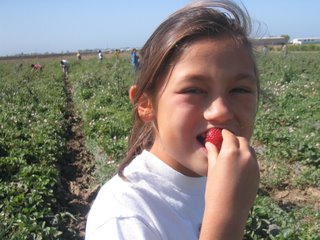Food For Thought-Part I

I remember growing up and going to visit my cousins on their farm in rural Indiana. We would go for tractor rides and pick vegetables to be prepared for our dinner that evening. What a great experience for a child to learn first hand about a farm.
I was inspired when I read about a program in Ojai, California called "Food For Thought-The Ojai Healthy Schools Program”. I contacted the program in an effort to do a report for Fer Food. Marty Fujita, one of the program’s co-founders agreed to answer some of my questions. Half of this interview will be posted today and the other half posted tomorrow.
Fer: In your own words-can you give me the background of why you started your program and how you came up with the idea and name?
Marty Fujita: I first moved to Ojai in 2003 with my family from the Bay Area, where we learned to really appreciate good, fresh food and cooking. I am an ecologist by training. These two things--an appreciation for good, healthy food and concern for the environment--got me thinking about how to institute a farm-to-school program for my kids' school here in Ojai. (They were also rather dismayed with the cafeteria food offerings, so part of the motivation was to see how we could promote healthier offerings in the school lunch program.) I helped to get a group of concerned parents and professionals together in a steering committee to help plan and organize; one of these parents is a very talented graphic artist and chef named Jeri Oshima. She came up with the name and the logo for our program: Food For Thought Ojai.
Fer: How many years has the program been active?
Marty Fujita: It officially was launched in September of 2003 at one elementary school in our district. Since then the program has grown and is now going at all the elementary schools; this year we started at the junior high school as well.
Fer: Can you take a guess at the amount of children and families that your program has helped? Or how many it helps now?
Marty Fujita: This is difficult to estimate. However, we conduct nutrition education sessions in class for all 3rd and 6th grades at all five elementary schools; garden-based learning sessions for all Kindergarten, first and 5th grades; farm field trips for all 4th graders and for selected classes at the junior and senior high schools. The farm-fresh seasonal salad bar meal is held once a week at all five elementary schools. We hold community outreach and events that are open to the entire community. There are approximately 3,000 kids in the district's schools; the greater Ojai Valley has a population of about 15,000 people. Most students in the district have been influenced by our program to some extent; most families in the district know about our program. It is difficult to assess what kind of impact we have made with regard to influencing kids making healthier choices, or raising awareness about eating locally grown foods, supporting local farmers, or being better environmental stewards, but we try to get that message out in as many ways as possible!
Fer: How do you introduce the program to the new children and families just starting each year? Is it one on one? Or with the entire family? How is the program implemented throughout the year?
Marty Fujita: We give a brief presentation at each school at back to school gatherings, orientations or other opportunities. We also try to get as many volunteers to help us implement our program as possible. We conduct orientations for the salad bar for K and 1st graders to help them learn to make a well-balanced meal from the salad bar; we also do taste-testing of items in season (e.g. Fuyu persimmons, yellow watermelon, different kinds of tangerines, etc.) to get the kids to try new things. We now have two part-time staff, a program coordinator who helps to coordinate schedules for teaching, organizes volunteer trainings, and in general serves as our liaison with the school district. We have hired professional registered dieticians to develop the curriculum that incorporates state standards, and they teach the volunteers who actually deliver the lessons. We also have a part-time garden coordinator, who trains volunteers to deliver the garden-based learning lessons, maintains the gardens, and organizes garden clubs at each school. Board members also volunteer for various needs.
Fer: What do you believe is our largest problem with the way our society eats? Is there one thing each one of us can do to make a difference?
Marty Fujita: We do not appreciate good, wholesome foods. We are much more concerned about cheap prices and convenience because we lead overly busy lives. The average American spends about 15% of their income on food. The average European spends about 30% of their income on food--much better, fresher, foods--because they appreciate good foods. This is why we have a 'Fast Food Nation' that now faces an obesity epidemic. We can try to overcome this by understanding that "we are what we eat"; read ingredient labels, shop at your local farmers market, buy whole foods that are fresh, in-season and local as much as possible, sit down with your family to enjoy dinner and conversation, and teach these things to your kids!
www.foodforthoughtojai.org
Photo above by Marty Fujita

1 Comments:
Hi folks. I just wanted to let you know that my cousin, Marty Fujita, passed away during the morning of February 8, 2010 after a long, courageous battle against lung cancer. She loved her family and her many friends. She never would settle for the status quo. She would drop everything to help a friend. She would advocate change and info exchange in order to make the world around her a little better. She was one of the bravest people I have known. Good night, Marty.
Post a Comment
<< Home